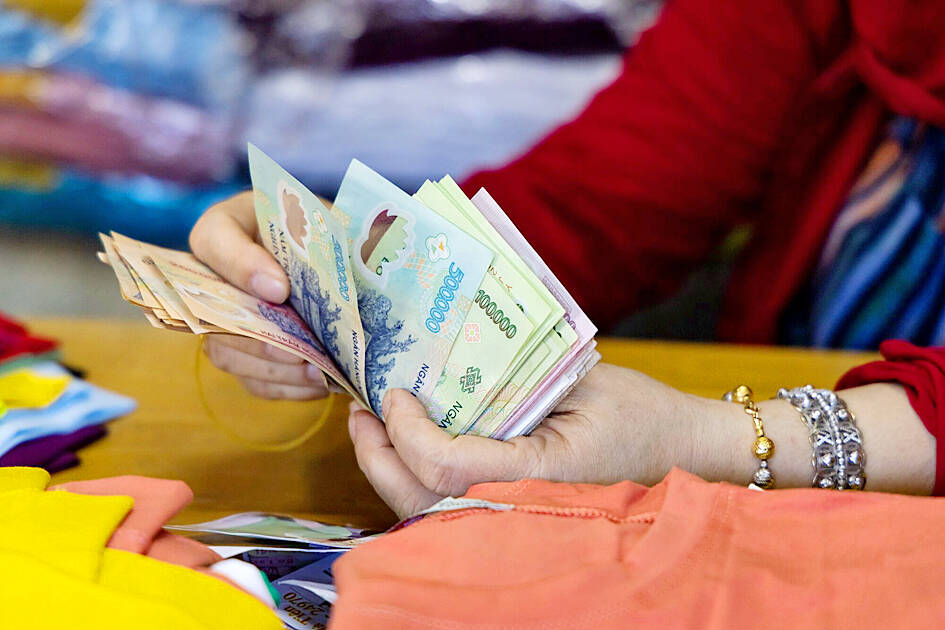The US trade deficit with Vietnam exceeded US$110 billion in the first 11 months of last month, latest US figures showed, as exports from the Southeast Asian industrial hub grew amid a record fall of its currency against the US dollar.
The latest reading, released on Tuesday by the US statistics agency, showed a nearly 18 percent rise in the deficit compared with the same period the previous year.
The data confirms the country has the fourth-highest commercial surplus with the US, topped only by China, the EU and Mexico.

Photo: Bloomberg
The large gap is seen by analysts as a major risk for the export-reliant nation amid threats from US president-elect Donald Trump to impose tariffs of up to 20 percent on all US imports.
That risk has been compounded by a sharp fall of Vietnam’s dong in recent months, with the dong trading near its lowest ever levels against the US dollar. The trend is closely watched in Washington as Vietnam is one of the countries under scrutiny for potential currency manipulation.
Vietnam, which counts the US as its biggest market, is home to big export-focused industrial operations of US multinationals such as Apple Inc, Google, Nike Inc and Intel Corp.
Latest seasonally adjusted trade figures showed that the trade gap with the US expanded by US$11.3 billion in November, accelerating from October, while in the January-to-November period Vietnam accumulated a trade surplus of US$111.6 billion, up from US$94.8 billion in the same period in 2023. Unadjusted data pointed to a larger gap of US$113.1 billion.
“If the US perceives that Vietnam is deliberately keeping the dong weak to gain an unfair trade advantage, it could trigger renewed accusations of currency manipulation,” said Leif Schneider, head of international law firm Luther LLC in Vietnam.
Trump ended his first term in the White House with Treasury declarations of Vietnam and Switzerland as currency manipulators over their market interventions to weaken the value of their currencies.
Vietnam’s central bank has said it was ready to intervene in the foreign exchange market in case of adverse economic impacts from currency moves and has sold US dollars in the past to strengthen the dong.
The dong’s most recent depreciation against the US dollar is broadly in line with other major currencies.

Taiwan Semiconductor Manufacturing Co (TSMC, 台積電) secured a record 70.2 percent share of the global foundry business in the second quarter, up from 67.6 percent the previous quarter, and continued widening its lead over second-placed Samsung Electronics Co, TrendForce Corp (集邦科技) said on Monday. TSMC posted US$30.24 billion in sales in the April-to-June period, up 18.5 percent from the previous quarter, driven by major smartphone customers entering their ramp-up cycle and robust demand for artificial intelligence chips, laptops and PCs, which boosted wafer shipments and average selling prices, TrendForce said in a report. Samsung’s sales also grew in the second quarter, up

On Tuesday, US President Donald Trump weighed in on a pressing national issue: The rebranding of a restaurant chain. Last week, Cracker Barrel, a Tennessee company whose nationwide locations lean heavily on a cozy, old-timey aesthetic — “rocking chairs on the porch, a warm fire in the hearth, peg games on the table” — announced it was updating its logo. Uncle Herschel, the man who once appeared next to the letters with a barrel, was gone. It sparked ire on the right, with Donald Trump Jr leading a charge against the rebranding: “WTF is wrong with Cracker Barrel?!” Later, Trump Sr weighed

HEADWINDS: Upfront investment is unavoidable in the merger, but cost savings would materialize over time, TS Financial Holding Co president Welch Lin said TS Financial Holding Co (台新新光金控) said it would take about two years before the benefits of its merger with Shin Kong Financial Holding Co (新光金控) become evident, as the group prioritizes the consolidation of its major subsidiaries. “The group’s priority is to complete the consolidation of different subsidiaries,” Welch Lin (林維俊), president of the nation’s fourth-largest financial conglomerate by assets, told reporters during its first earnings briefing since the merger took effect on July 24. The asset management units are scheduled to merge in November, followed by life insurance in January next year and securities operations in April, Lin said. Banking integration,

LOOPHOLES: The move is to end a break that was aiding foreign producers without any similar benefit for US manufacturers, the US Department of Commerce said US President Donald Trump’s administration would make it harder for Samsung Electronics Co and SK Hynix Inc to ship critical equipment to their chipmaking operations in China, dealing a potential blow to the companies’ production in the world’s largest semiconductor market. The US Department of Commerce in a notice published on Friday said that it was revoking waivers for Samsung and SK Hynix to use US technologies in their Chinese operations. The companies had been operating in China under regulations that allow them to import chipmaking equipment without applying for a new license each time. The move would revise what is known